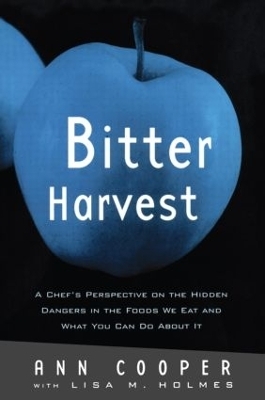
Bitter Harvest
A Chef's Perspective on the Hidden Danger in the Foods We Eat and What You Can Do About It
Seiten
2000
Routledge (Verlag)
978-0-415-92227-2 (ISBN)
Routledge (Verlag)
978-0-415-92227-2 (ISBN)
In Bitter Harvest, this knowledgeable chef emerges as a political voice to be reckoned with and her manifesto is a must-read for anyone concerned with health, nutrition and the future of our food.
The history of food is not as straightforward as it may seem. Food isn't just food. It is ritual, tradition and memory. So begins Ann Cooper's groundbreaking new book on the history of sustenance. Cooper, a renowned chef and graduate of New York's famed Culinary Institute of America, expertly guides us from the roots of agriculture in North America through the profound changes initiated by the Industrial Revolution, all the way up to the present day, offering analyses of recent controversies such as Europe's campaign against Frankenstein food and the genetic engineering of plants and animals in the United States. Throughout, Cooper takes both a macro and micro approach, examining the effect politics, technology, war, international trade and agribusiness have had on the world's food supply, as well as the changing social patterns which have made a family meal at the table almost a relic of the past. Did you know? · 80% of chicken has salmonella. · By the year 2010, 95 percent of items bought at the grocery store may be consumed within 20 minutes of getting them home. · Cancer researchers believe that over one third of all future cancers will be diet-related -- roughly the same proportion now attributable to smoking. Passionate, political, informed and engaging, Bitter Harvest is filled with fascinating facts and anecdotes. Cooper offers a comprehensive analysis of the issue of sustainability, arguing persuasively why we must begin to change everything from the way food is shipped to the basic components of our diets. Touching on virtually every aspect of the food culture, Bitter Harvest is a vibrant example of the emergence of the chef as a political voice to be reckoned with. A food manifesto for the new millennium, it is a must-read for anyone concerned with health, nutrition and the future of our planet. You will never look at your dinner plate in quite the same way again.
The history of food is not as straightforward as it may seem. Food isn't just food. It is ritual, tradition and memory. So begins Ann Cooper's groundbreaking new book on the history of sustenance. Cooper, a renowned chef and graduate of New York's famed Culinary Institute of America, expertly guides us from the roots of agriculture in North America through the profound changes initiated by the Industrial Revolution, all the way up to the present day, offering analyses of recent controversies such as Europe's campaign against Frankenstein food and the genetic engineering of plants and animals in the United States. Throughout, Cooper takes both a macro and micro approach, examining the effect politics, technology, war, international trade and agribusiness have had on the world's food supply, as well as the changing social patterns which have made a family meal at the table almost a relic of the past. Did you know? · 80% of chicken has salmonella. · By the year 2010, 95 percent of items bought at the grocery store may be consumed within 20 minutes of getting them home. · Cancer researchers believe that over one third of all future cancers will be diet-related -- roughly the same proportion now attributable to smoking. Passionate, political, informed and engaging, Bitter Harvest is filled with fascinating facts and anecdotes. Cooper offers a comprehensive analysis of the issue of sustainability, arguing persuasively why we must begin to change everything from the way food is shipped to the basic components of our diets. Touching on virtually every aspect of the food culture, Bitter Harvest is a vibrant example of the emergence of the chef as a political voice to be reckoned with. A food manifesto for the new millennium, it is a must-read for anyone concerned with health, nutrition and the future of our planet. You will never look at your dinner plate in quite the same way again.
Ann Cooper is Executive Chef of The Ross School and was previously Executive Chef of The Putney Inn for the past nine years. She is also the Executive Chef of The Telluride Film Festival and an Industry Services consultant for The Culinary Institute of America.
1. A Brief history of Food and Agriculture 2. Sustainabilit 3. Agribusiness: Controlling Our Food 4. The Government: The Hand That Shapes and Molds Our Food 5. We Are What We Eat 6. The Future
| Erscheint lt. Verlag | 24.8.2000 |
|---|---|
| Verlagsort | London |
| Sprache | englisch |
| Maße | 152 x 229 mm |
| Gewicht | 589 g |
| Themenwelt | Geschichte ► Allgemeine Geschichte ► Zeitgeschichte |
| Geschichte ► Teilgebiete der Geschichte ► Kulturgeschichte | |
| Geisteswissenschaften ► Psychologie | |
| Studium ► 1. Studienabschnitt (Vorklinik) ► Med. Psychologie / Soziologie | |
| Studium ► Querschnittsbereiche ► Prävention / Gesundheitsförderung | |
| Naturwissenschaften ► Biologie ► Genetik / Molekularbiologie | |
| Sozialwissenschaften ► Politik / Verwaltung | |
| Sozialwissenschaften ► Soziologie | |
| Technik | |
| ISBN-10 | 0-415-92227-5 / 0415922275 |
| ISBN-13 | 978-0-415-92227-2 / 9780415922272 |
| Zustand | Neuware |
| Informationen gemäß Produktsicherheitsverordnung (GPSR) | |
| Haben Sie eine Frage zum Produkt? |
Mehr entdecken
aus dem Bereich
aus dem Bereich
Gewalt, Umwelt, Identität, Methode
Buch | Softcover (2024)
Spector Books OHG (Verlag)
CHF 49,95


